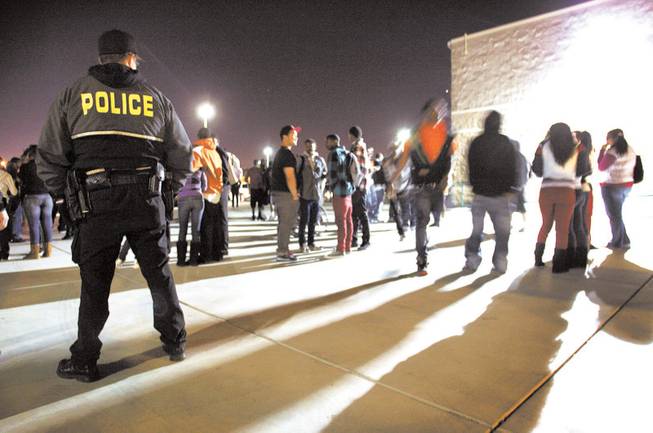
A Clark County School Police officer monitors Mojave High School students after a basketball game last week. The district’s human resources chief says overtime is reasonable when jobs can be completed in short periods. But hiring might be cheaper for continuous work.
Monday, Dec. 14, 2009 | 2 a.m.
In Today's Sun
Sun Archives
- District dozen hit jackpot with overtime pay (1-7-2007)
- Taxpayers save, thanks to overtime crackdown (1-14-2008)
- Overtime total jumps again (8-3-2007)
- OT costs surge, point to taxes that could’ve been spent more wisely (4-15-2007)
- The advantage of public service (2-18-2007)
- Roofer super’s super riches: Bigger bucks than boss (9-28-2006)
- School district police made $1 million-plus in overtime (5-5-2004)
Sun Coverage
In 2008, when overtime costs — and public outrage — were cresting, the Clark County School District put new rules in place, setting strict limits on the number of extra hours employees could work and changing how those assignments are awarded.
The effort seems to be paying off.
Through Nov. 18, the district’s total overtime costs for the calendar year stood at over $5 million, down from nearly $13 million for all of 2008.
The cutbacks in overtime were driven by a change in management philosophy as well as massive cuts in state education funding.
New rules approved by the Clark County School Board in January prohibit employees from working more than 24 hours of overtime per week. The lowest-paid qualified employee must be the first offered extra work, and department heads must turn in quarterly overtime reports, to allow the central office to keep better tabs on the costs.
“When you have to start itemizing what your costs are, and justify them to someone else, you become more careful,” said Carole Vilardo, president of the Nevada Taxpayers Association. “Quarterly reports make sense because it allows you to track not only the costs, but the reasons behind them and to determine whether there’s a better way to avoid the use of overtime.”
Only campus police and support employees — who include maintenance and facilities workers — can earn overtime. Teachers and administrators are not eligible.
Twelve of the district’s 13 divisions showed reductions in overtime expenses ranging from 2 percent to 96 percent. Only the office of the superintendent showed an increase in overtime — 13.4 percent. But in terms of actual dollars, it was relatively inexpensive: $22,990 for 523 staff hours, compared with the 147,111 total overtime hours logged across the district, totaling $5.13 million in overtime pay.
In 2008, a dozen district employees each worked at least 1,000 hours of overtime — nearly all of them School Police officers. So far this year, one person — School Police Officer Ching Johnson — has accrued 745 hours of overtime, and only six employees — five of whom are with School Police — have worked more than 600 hours.
Johnson has earned $100,040 in pay so far this year, including $38,168 in overtime. Ronald Narvid, a construction supervisor in the facilities division, has so far earned $103,211, including $35,196 for 640 overtime hours.
To be sure, there are circumstances when paying overtime makes sense. The school system pays time-and-a-half for the extra hours, but hiring additional workers would bring the added costs of health, retirement and other benefits.
The district limits overtime to legitimate emergencies or when it’s more efficient or economical than adding staff or hiring a contractor, Clark County Schools Superintendent Walt Rulffes said. He said he welcomes scrutiny of the district’s procedures, referring to an examination of overtime expenses published last year in the Sun.
Accruing overtime has “evolved to many as a benefit (for workers), so unless it’s carefully monitored and scrutinized, it tends to proliferate,” Rulffes said.
Martha Tittle, the district’s human resources chief, said while she’s pleased the district’s overall overtime costs have dropped by more than 55 percent since 2008, there are still areas where additional savings might be found. Tittle said she’s asking all division heads and campus administrators — who must sign off on overtime requests — to consider whether the work to be done is an “essential function.”
Overtime isn’t inherently problematic, said Tittle, whose own division has reduced its extra-hour costs to $17,989 so far this year, from $49,083 in 2008.
“If it’s for a limited function over a short period of time, it can really be less expensive than hiring full-time staff,” Tittle said. “But if overtime is needed on a continual basis, hiring someone might end up being cheaper. We have to strike that balance.”


Join the Discussion:
Check this out for a full explanation of our conversion to the LiveFyre commenting system and instructions on how to sign up for an account.
Full comments policy